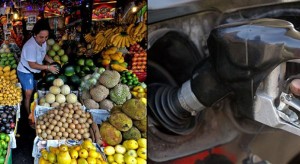Interest rates seen to remain low

Lower food and fuel costs led to a slower rate of consumer price increases in October as expected, giving space for authorities to encourage economic activity by keeping interest rates low. INQUIRER FILE PHOTOS
MANILA, Philippines–Lower food and fuel costs led to a slower rate of consumer price increases in October as expected, giving space for authorities to encourage economic activity by keeping interest rates low.
Official data released on Wednesday showed that inflation decelerated for the second consecutive month as international fuel prices slumped to their lowest level in years. Food supply issues that drove prices of commodities such as food up earlier in the year have also abated.
These partly offset the effects of higher utility rates that took effect in October, the Philippine Statistics Authority (PSA) reported.
“Softening inflation together with developments abroad deliver to Bangko Sentral ng Pilipinas (BSP) policy space to allow recent tightening moves to work through the economy,” said Joey Cuyegkeng, ING Bank’s economist in Manila.
In October, inflation eased to 4.3 percent, slowing from October’s 4.4 percent. This was within the BSP’s target range for the month set at 3.7 to 4.6 percent and was also in line with projections of banks polled by the Inquirer this week.
The BSP’s main goal is to protect the peso’s purchasing power by keeping consumer prices stable. This is done by influencing the amount of money circulating in the economy and cash lent by banks to consumers and businesses.
Consumer price increases peaked at 4.9 percent in July and August as a result of the country’s thin food supply and infrastructure bottlenecks that drove up production costs and high fuel prices.
Barclays Bank said in a note to clients Wednesday that it expected inflation to continue to decline in the remaining months of the year mainly due to lower fuel costs.
Saudia Arabia, the world’s second-largest oil exporter, earlier cut its export prices to a three-year low due to weak demand from advanced markets.
Another major factor that led to higher inflation in previous months was Manila’s truck ban, which slowed the movement of containers in and out of the port area in Tondo, the transit point for most of the nation’s freight. The truck ban was implemented to ease traffic, which cost the economy an estimated P2.4 billion daily due to lost productivity.
However, a report by Citi in March said losses due to traffic were dwarfed by the P320 billion the economy stood to lose due to higher production costs that resulted from the delayed delivery of goods to manufacturers. The truck ban was lifted in September of this year.
BSP Governor Amando M. Tetangco Jr. said in a statement on Wednesday that slower inflation in October gave monetary authorities “comfort that the inflation target for the year is safe.” This year, the BSP expects inflation to average at 4.4 percent, which is within the target range of 3 to 5 percent.
“These developments give us room to pause (monetary tightening),” he said.
Earlier this year, an inflation-wary BSP became aggressive in mopping up liquidity from the economy. Regulators adjusted all major policy levels to encourage banks to keep more money idle in BSP vaults.














